A pergola is more than just a stylish outdoor structure; it's a valuable addition to your backyard that enhances both functionality and aesthetic appeal. Whether you use it as a cozy spot for family gatherings, a shaded retreat from the sun, or a picturesque space for climbing plants, maintaining your pergola is essential to ensure its longevity and beauty.

Letís explore the maintenance needs for different types of pergolasówood, aluminum, vinyl, and fiberglass. As well as cover how to care for your pergolaís accessories like vines, shades, fans, lighting, and fabric covers.
Different types of pergolas will have different needs when it comes to maintenance, how to care for them and how frequently they need attention differs greatly. Itís best to refer back to your care and maintenance guide if one came with your pergola, as manufacturers instructions are always the best to follow. But here are some general guidelines based on pergola type.
Wood Pergolas typically require the most amount of maintenance compared to other materials. Regular maintenance on a wood pergola is arguably more important than with other structures in prolonging the life of your pergola as wood is already at a great risk of deterioration from water and insects.
Start by sweeping away any debris from the surface. Use a soft-bristled brush or a leaf blower for larger areas. For a deeper clean, mix a mild detergent with water and scrub the wood with a soft sponge. Avoid harsh chemicals that can damage the finish.
Check for signs of rot, mildew, or insect infestations. Early detection is crucial. If you find any damaged sections, sand them down and apply a wood preservative. You may even need to replace individual pieces to prevent your pergola from collapsing under weakened or broken sections.
Check your base plates and fasteners around the pergola to make sure none have loosened, tighten as necessary.
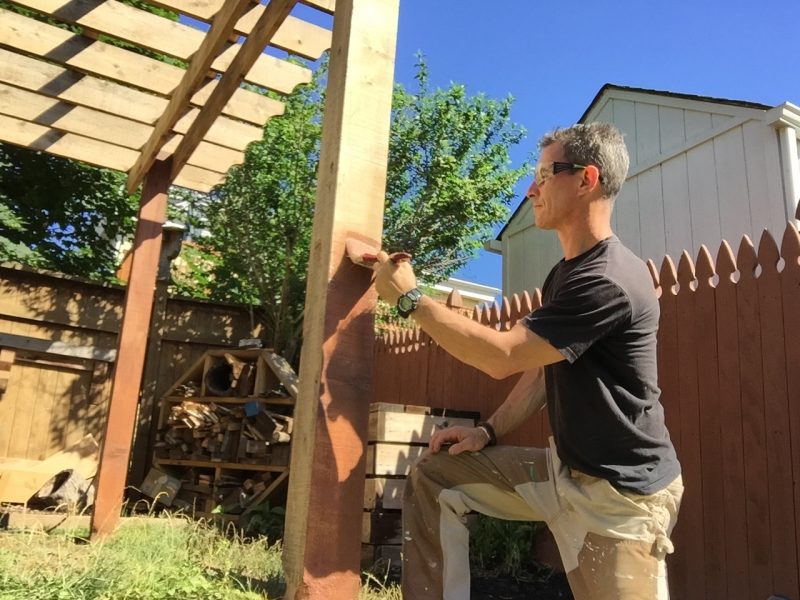
To protect your wood pergola from the elements, apply a weather-resistant sealant or stain. Reapply every 1-2 years, depending on your climate. This will help prevent cracking, peeling, and fading.
Aluminum pergolas are known for their durability and low maintenance. Still, you want to look over your pergola occasionally for any signs of failure or at least to give it good clean occasionally.
Aluminum pergolas should be cleaned regularly to prevent dirt buildup. Use a mild soap solution and a soft cloth to wipe down the surface. Avoid abrasive cleaners that can scratch the finish. A power washer on a lower pressure setting can also be used to clean your structure.
Although aluminum is resistant to rust, it's a good idea to inspect for any signs of corrosion. If you spot any, gently sand the area and touch up with paint designed for aluminum surfaces.
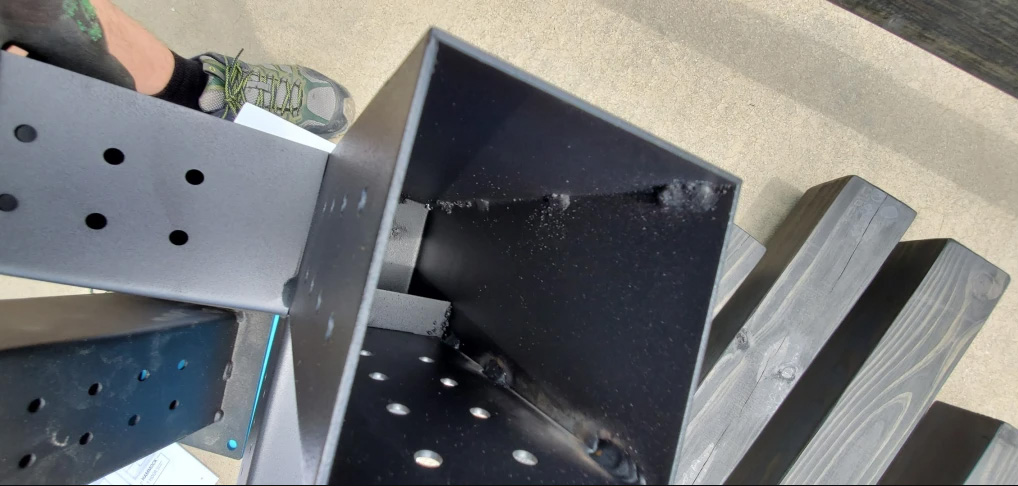
If your aluminum pergola has any welded pieces, inspect those carefully to make sure those welds are holding. Particularly on less expensive aluminum pergolas, and those not properly anchored, strong winds can move and shift your pergola which can weaken the welds or cause them to break altogether.
If your aluminum pergola has adjustable components, such as a retractable roof or movable louvers, ensure that you lubricate the moving parts periodically to ensure smooth operation.
Vinyl pergolas offer a sleek, modern look and are virtually maintenance-free, itís one of their biggest selling points but itís smart to be observant.
Vinyl is resistant to stains and discoloration but can collect dust and dirt. Lighter colored pergolas also will show dirt more easily than a dark wood or black aluminum pergola would. Wash it with a mixture of water and mild detergent, using a soft brush to remove any grime. Rinse thoroughly with water. You can use a power washer but start on a low pressure setting. We have found scuff marks easily buff out with a Mr. Clean Magic Eraser Sponge.
While vinyl is durable, it can crack Ė lawn mowers launching a rock at your post could potentially chip the vinyl. Check for any signs of damage and replace any broken parts as needed.
To prevent discoloration from UV rays, use a UV-protectant cleaner and avoid leaving harsh chemicals on the surface. If you live in a snowy region, keep artificially colored salt away from your pergola posts as prolonged contact could cause staining.
Fiberglass pergolas are also very durable and weather-resistant, but they still need some care.
Fiberglass surfaces can be cleaned with a mixture of water and mild detergent. Use a non-abrasive sponge or soft cloth and gently scrub to avoid scratching the surface. Rinse thoroughly to remove any soap residue. Do not use a power washer on a fiberglass pergola, power washers are too strong and can damage your pergola.
Check for any cracks or signs of wear, particularly at joints and seams. Repair any damage promptly to prevent further issues.
Paint adheres well to fiberglass and most fiberglass pergolas will probably include a protective finish. However, itís important check your pergola annually to make sure any scratches or marks in the protective finish are touched up right away. Use the touch up paint provided by your manufacturer or a reputable exterior paint.
Traditionally pergolas can be found draped in vines and climbing plants. Itís a way to increase natural beauty around a structure as well as increase shade and create a bit of a wind block as the vines grow in thickly. But you may need to do some maintenance on them yearly to protect your structure.
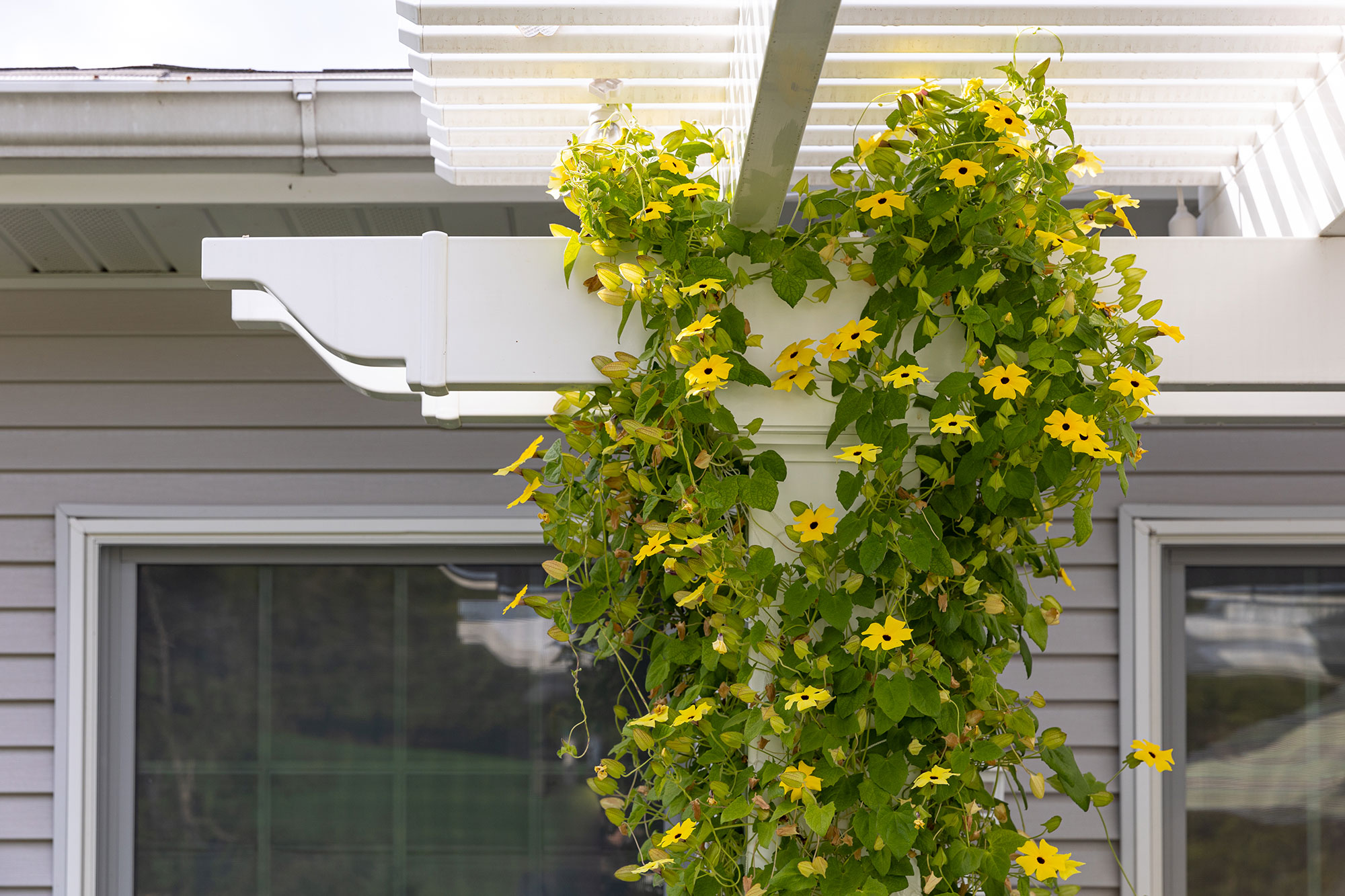
Some vines grow thick and heavy over time, if you have a lightweight aluminum or wood pergola you need to prune your vines so that the weight doesnít collapse your structure.
Vines also hold in moisture against your pergola causing rot or mold. To preserve the longevity, you need to make sure you prune back vines to properly seal wood pergolas regularly or clean aluminum, vinyl or fiberglass pergolas to remove any signs mold and mildew.
Pull down or automatic sun shades provide additional comfort and protection from the rising or setting sun as well as provide some privacy.
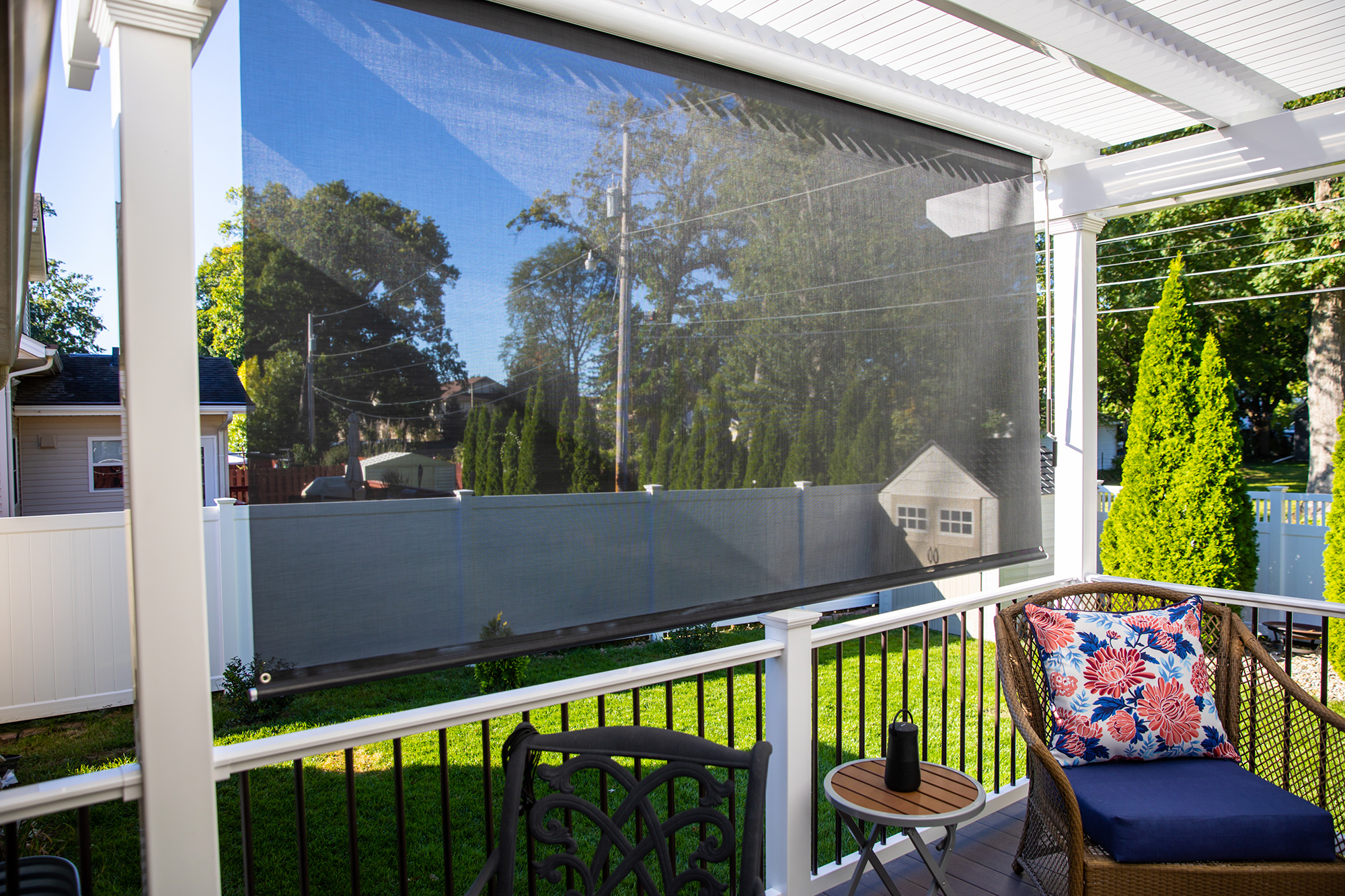
Most shades can be cleaned with a mild detergent and water. Check the manufacturer's instructions for specific cleaning recommendations based on the type of shade fabric your shade is made with. You should also regularly check for any tears or fraying and repair or replace damaged sections as needed. Also make sure the attachment points of your shade to your pergola are securely fastened.
Fans are great for additional airflow on hot days, but you need to periodically clean and care for your fan to keep it operating smoothly.
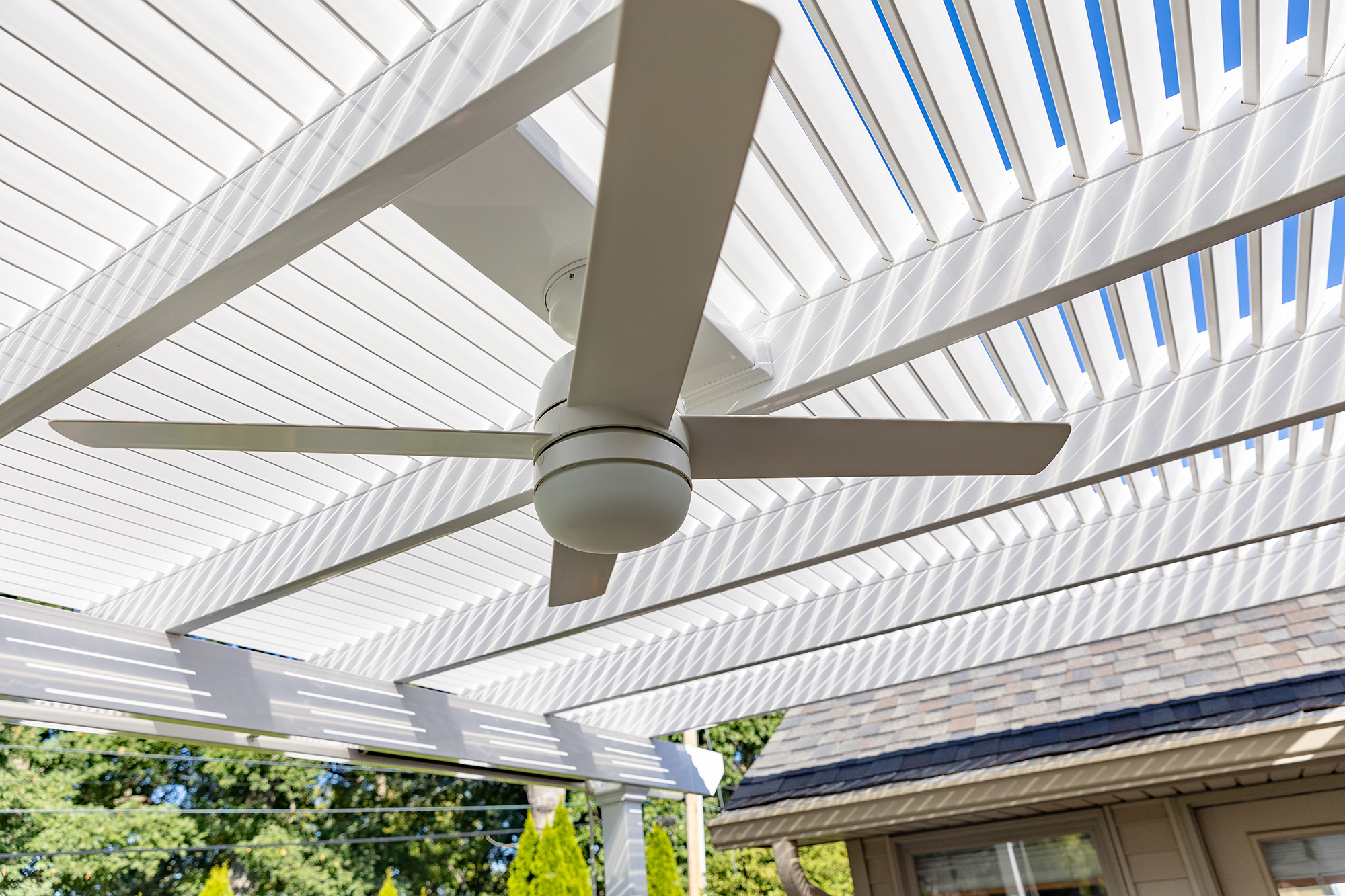
Dust the blades regularly and ensure they are free of debris, especially around the housing for the motor. For a more thorough cleaning, use a vacuum cleaner with a brush attachment.
One of the most important safety guidelines for an outdoor fan is to make sure it is a WET rated outdoor fan. These fans provide the necessary construction to keep the motor dry and operational in the wet and humid conditions a pergola fan will endure.
If you notice any issues, such as wobbling or unusual noises when your fan is running, check for loose screws or call a professional.
Outdoor lighting for your pergola is both convenient and adds ambiance to your space at night. Keep your lighting clean by wiping down light fixtures with a damp cloth to remove dirt and dust. Regularly inspect bulbs and wiring for any signs of wear or damage. Replace burnt-out bulbs and repair any faulty or exposed wiring to keep your lights functioning properly.
If your pergola has an overhead cover or shade, you should also regularly clean and care for this part of the structure as well.
Follow the manufacturer's instructions for cleaning fabric covers. Generally, a mild detergent and water solution works well. After rain or precipitation make sure they are fully extended to dry out and donít fold or store them before they are completely dry.
Check for any rips, tears, or loose stitching. Repair or replace damaged covers as needed. Many manufacturers suggest keeping a fabric overhead shade retracted during storms to prevent damage.
Many modern pergolas feature upgraded electrical and motorized components for various features; motorized roofs and louvers that can open and shut, side screens that move up and down to enclose your pergola, the fans and lighting mentioned earlier, heaters, misters and more.
If your pergola enhancements include remote controls to operate, keep your remote in a cool and dry space to avoid deterioration. Remove batteries if not using for extended periods of time. And replace with fresh batteries as needed.
Check around moving parts, like movable louvers to ensure no branches, build up of leaves, etc will impede the ability to open and close fully. Some may require regular maintenance to lubricate around such moving parts as well, refer to your owners manual to follow your manufacturers instructions.
Anytime electrical components are a part of your structure you should routinely check for fraying or damaged wiring. This damage can lead to deadly electrocution or spark fires that can destroy your structure and possibly spread to your home.

Maintaining your pergola is crucial to ensuring its longevity and keeping it looking its best. Whether you have a wooden, aluminum, vinyl, or fiberglass pergola, each type requires specific care to protect it from the elements and wear and tear. Proper maintenance of accessories like shades, fans, lighting, and fabric covers enhances the functionality and enjoyment of your outdoor space as well as keeps you and your family safe. By following these guidelines, you can keep your pergola in excellent condition and continue to enjoy its beauty and utility for years to come.
If you can’t find what you’re looking for please give us a quick call at 563-345-6745 or use our chat box in the bottom left corner of your screen!